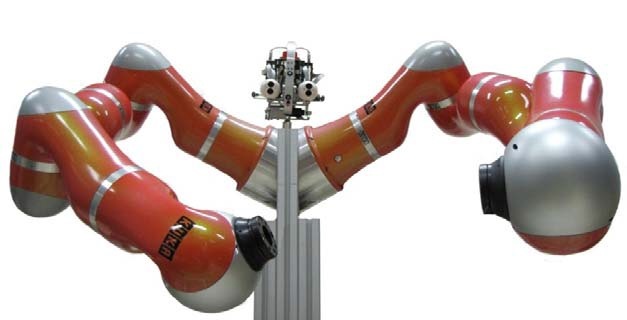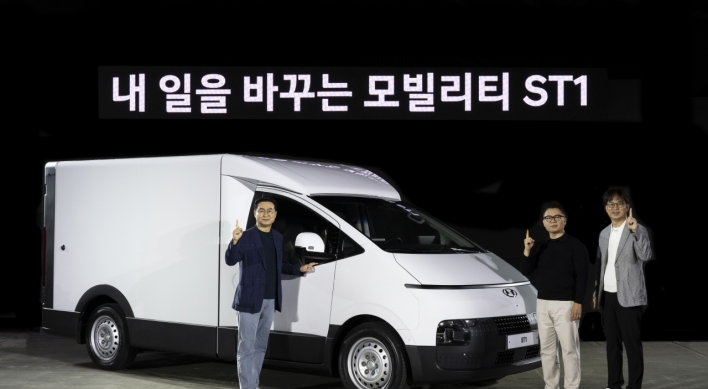[ANALYST REPORT] The global robot revolution is here, and growing
By Korea HeraldPublished : June 17, 2016 - 17:39
The past month has seen a spate of robotics M&A activity around the world. China tipped its hand to its RIoT ambitions with a USD5bn offer for Germany’s Kuka, one of the world’s leading robotics companies. Kuka has traditionally been a strong player in the industrial robot space but recently has been aggressively moving into the service robotics domain due to the expected massive growth of the segment.
Toyota is also reported to be in talks with Google to acquire Boston Dynamics and Schaft—the world’s premier bipedaland quadruped robotics builders.
The Japanese automaker also recently took a sizable stake in Uber, the ridesharing platform developer from San Francisco. Uber has its own autonomous car and RIoT program so it should be interesting to see how this alliance plays out.
Earlier in the year Toyota scooped up what could best be called a ‘Dream Team’ of some the world’s top names in robotics and artificial intelligence to run its robotics/AI/autonomous vehicle innovation centers in Silicon Valley, Boston, and Detroit.
On the consumer robotics front, several consumer electronics companies have announced robotics initiatives. At Computex, Taiwanese PC maker Acer unveiled its USD599 Zenbo home robot, which appears to be the company’s attempt to make a mobile version of Amazon’s Echo. Attached to the top of the body via a metal arm is the robot‘s face, a screen with a built-in display that can display information. It also includes a camera, which can take photos and videos, detect faces and remotely monitor the home through an app. Zenbo wins in the area of mobility but is not even a close match for Amazon’s Echo in terms of practicality and ‘intelligence’.

Asus believes Zenbot’s monitoring capabilities will be useful for senior citizens. The robot also comes with a selection of children’s books and games. Some features, such as controlling connected devices, require developer support.
In addition to mobility, Zenbo listens and responds to verbal commands, works with social media, and has stereo speakers.
Zenbo is also reminiscent of Softbank‘s Pepper, a mobile humanoid that can detect their owners’ emotions based on expressions and voice tones. But those cost USD1,700 and still are not widely available almost two years after they were announced.
China’s Cowa Robot unveiled a line of smart luggage that uses auto-follow technology to follow the owner.
To activate it, all a traveler has to do is press a button in the handle and walk. The Cowa will then follow the owner by using the intelligent sensors in the case and a tracker bracelet worn by the passenger.
The robo-luggage utilizes the latest technology to avoid anything in its path and looks for its owner if it gets separated. It can follow a specific path, and it has a handle so it can be dragged in busy spaces.
It weighs 10lbs and has USB ports and a built in charger for smartphones and tablets.
SK Telecom (017670.KS, BUY) has been making notable advances in its robotics endeavors as seen in the 5G rescue robot program and the educational robot Albert. Far more interesting, however, is the Vyo social robot project, which appears far more promising than other social robots currently on the market and in development.
What gives Vyo more potential, and leads us to believe SKT has a better view of RIoT and robotics, in general, is that it breaks the ‘traditional’ social home robot mold in which a tablet computer is added to a nonthreatening robot body with a limited amount of freedom. And then the companies do their utmost to ensure that the speech recognition and conversation algorithms to entertain the general public.
The problem with this approach is that it is nothing more than an overpriced and pointless extension of a smart device.
The major difference with Vyo, however, is that the robot is “a personal assistant serving as a centralized interface for smart home devices.” Though the idea is not new, what is key is the execution of the idea. And what makes Vyo different is its approach to HRI (human-robot interaction). The robot is a mix of non-anthropomorphic design and anthropomorphic expressiveness with a tactile object-based control system. And in our view, Vyo is compelling evidence that SKT is developing technologies that may help define the future of home robotics.
In medical robotics, Korea’s Koh Young Technology (098460.KQ, Not Rated) is slated to file for KFDA approval for its ‘Brain Surgery Robot System’ and has plans to file with the US FDA later in the year. We visited the company and learned that it recently hired a well-known AI expert from the US to help it with its algorithm endeavors.
From what we gather about the robot, we believe the company has a tremendous opportunity to become a major player in the neurosurgery space with this technology.
In the US, the FDA just approved the first medical robot from Auris, a secretive startup from the co-founder of Intuitive Surgical, the maker of the popular da Vinci robot. Industry observers believe the company may be preparing a supervised autonomous system soon. We will closely monitor developments and provide our views in our upcoming in-depth report on medical robotics.
For aerial robotics/drones, we visited Hankuk Carbon (017960.KS, Not Rated) to learn more about its partnership with Israel Aerospace Industries (IAI), one of the world’s premier military drone makers.
We found that the venture is developing as planned and that Hankuk now has a team in Israel working with IAI.
We believe this partnership with IAI could propel Hankuk into the position of being Korea’s leading military drone maker in the future.

Korean robotics companies on the move In the Korean robotics space we think the following names are the most promising investment opportunities:
1) Hankuk Carbon, as the company is making good progress in the venture with IAI in the development of a nextgeneration VTOL drone. The company also dominates some of the other business segments in which it operates and has ample cash. IR also indicated that management is considering raising the dividend payout ratio.
We believe the partnership with IAI, if successful, will provide Hankuk with a decided technological edge over Korean Air Lines (003490.KS, Marketperform) and other domestic drone makers in the unmanned aerial vehicle market.
Japan’s Mitsui, a supplier of materials to Sony, recently entered the drone as a service (DAAS) business recently acquired a 10% stake in Hankuk. The company will begin supplying carbon fiber to produce lightweight vehicles.
At present the partnership with Mitsui is exclusively for automobiles but the LNG division could benefit if Mitsui wins shipbuilding orders.
Hankuk has been benefitting from increasing LNG demand since the 2011 Japan earthquake.
Korean shipbuilders now accounts for 80% of the company’s orders. LNG is relatively unaffected by the slumping shipbuilding sector, however new orders saw a moderate decline.
Overall, 2016 will see higher revenues from 2015 and this year’s order backlog is north of KRW300bn. The company has KRW120bn in net cash and maintains a zero-debt policy and has interest income. Operating profit and net profit are at similar levels. Glass paper is the company’s second-largest cash cow after LNG. Glass paper is mostly used in PVC flooring materials and key clients are LG Hausys, Hana LNC.
2) Hanwha Techwin (012450.KS, Not Rated) for its overall view of the RIoT ecosystem. The company is positioned to take advantage of being a supplier of military robotics. As a Korean player it has a strategic advantage in the sales space compared to Chinese rivals thanks to security concerns.
3) Yujin Robot (056080.KQ, Not Rated) for the success of GoCart V2 in recent tests at a hospital in Korea. There is very strong demand for GoCart as silver care facilities and hospitals in the US and EU are pressed to maintain quality and hold the line on costs while demand for care rises with the aging of the population. The company is now finalizing safety tests with the robot and plans to commercially launch in 4Q16 in the EU and 1Q17 in the US.
GoCart has tremendous opportunity because of the interest in the silver care space in the US and EU along with the lack of competition in the markets. There are other companies developing autonomous logistics systems but are lacking in the areas of sales network and technology. We believe Yujin Robot has at least a two-year lead in this business.
4) We think SKT is very interesting due to the strategic partnerships that the company has with robotics developers around the world. We believe the recent developments with Vyo and the 5G robot program indicate that he company has a view of the evolving RIoT ecosystem and is poised to become a leader in the service robotics pace.
Source: HMC Investment Securities http://www.hmcib.com/
Toyota is also reported to be in talks with Google to acquire Boston Dynamics and Schaft—the world’s premier bipedaland quadruped robotics builders.
The Japanese automaker also recently took a sizable stake in Uber, the ridesharing platform developer from San Francisco. Uber has its own autonomous car and RIoT program so it should be interesting to see how this alliance plays out.
Earlier in the year Toyota scooped up what could best be called a ‘Dream Team’ of some the world’s top names in robotics and artificial intelligence to run its robotics/AI/autonomous vehicle innovation centers in Silicon Valley, Boston, and Detroit.
On the consumer robotics front, several consumer electronics companies have announced robotics initiatives. At Computex, Taiwanese PC maker Acer unveiled its USD599 Zenbo home robot, which appears to be the company’s attempt to make a mobile version of Amazon’s Echo. Attached to the top of the body via a metal arm is the robot‘s face, a screen with a built-in display that can display information. It also includes a camera, which can take photos and videos, detect faces and remotely monitor the home through an app. Zenbo wins in the area of mobility but is not even a close match for Amazon’s Echo in terms of practicality and ‘intelligence’.

Asus believes Zenbot’s monitoring capabilities will be useful for senior citizens. The robot also comes with a selection of children’s books and games. Some features, such as controlling connected devices, require developer support.
In addition to mobility, Zenbo listens and responds to verbal commands, works with social media, and has stereo speakers.
Zenbo is also reminiscent of Softbank‘s Pepper, a mobile humanoid that can detect their owners’ emotions based on expressions and voice tones. But those cost USD1,700 and still are not widely available almost two years after they were announced.
China’s Cowa Robot unveiled a line of smart luggage that uses auto-follow technology to follow the owner.
To activate it, all a traveler has to do is press a button in the handle and walk. The Cowa will then follow the owner by using the intelligent sensors in the case and a tracker bracelet worn by the passenger.
The robo-luggage utilizes the latest technology to avoid anything in its path and looks for its owner if it gets separated. It can follow a specific path, and it has a handle so it can be dragged in busy spaces.
It weighs 10lbs and has USB ports and a built in charger for smartphones and tablets.
SK Telecom (017670.KS, BUY) has been making notable advances in its robotics endeavors as seen in the 5G rescue robot program and the educational robot Albert. Far more interesting, however, is the Vyo social robot project, which appears far more promising than other social robots currently on the market and in development.
What gives Vyo more potential, and leads us to believe SKT has a better view of RIoT and robotics, in general, is that it breaks the ‘traditional’ social home robot mold in which a tablet computer is added to a nonthreatening robot body with a limited amount of freedom. And then the companies do their utmost to ensure that the speech recognition and conversation algorithms to entertain the general public.
The problem with this approach is that it is nothing more than an overpriced and pointless extension of a smart device.
The major difference with Vyo, however, is that the robot is “a personal assistant serving as a centralized interface for smart home devices.” Though the idea is not new, what is key is the execution of the idea. And what makes Vyo different is its approach to HRI (human-robot interaction). The robot is a mix of non-anthropomorphic design and anthropomorphic expressiveness with a tactile object-based control system. And in our view, Vyo is compelling evidence that SKT is developing technologies that may help define the future of home robotics.
In medical robotics, Korea’s Koh Young Technology (098460.KQ, Not Rated) is slated to file for KFDA approval for its ‘Brain Surgery Robot System’ and has plans to file with the US FDA later in the year. We visited the company and learned that it recently hired a well-known AI expert from the US to help it with its algorithm endeavors.
From what we gather about the robot, we believe the company has a tremendous opportunity to become a major player in the neurosurgery space with this technology.
In the US, the FDA just approved the first medical robot from Auris, a secretive startup from the co-founder of Intuitive Surgical, the maker of the popular da Vinci robot. Industry observers believe the company may be preparing a supervised autonomous system soon. We will closely monitor developments and provide our views in our upcoming in-depth report on medical robotics.
For aerial robotics/drones, we visited Hankuk Carbon (017960.KS, Not Rated) to learn more about its partnership with Israel Aerospace Industries (IAI), one of the world’s premier military drone makers.
We found that the venture is developing as planned and that Hankuk now has a team in Israel working with IAI.
We believe this partnership with IAI could propel Hankuk into the position of being Korea’s leading military drone maker in the future.

Korean robotics companies on the move In the Korean robotics space we think the following names are the most promising investment opportunities:
1) Hankuk Carbon, as the company is making good progress in the venture with IAI in the development of a nextgeneration VTOL drone. The company also dominates some of the other business segments in which it operates and has ample cash. IR also indicated that management is considering raising the dividend payout ratio.
We believe the partnership with IAI, if successful, will provide Hankuk with a decided technological edge over Korean Air Lines (003490.KS, Marketperform) and other domestic drone makers in the unmanned aerial vehicle market.
Japan’s Mitsui, a supplier of materials to Sony, recently entered the drone as a service (DAAS) business recently acquired a 10% stake in Hankuk. The company will begin supplying carbon fiber to produce lightweight vehicles.
At present the partnership with Mitsui is exclusively for automobiles but the LNG division could benefit if Mitsui wins shipbuilding orders.
Hankuk has been benefitting from increasing LNG demand since the 2011 Japan earthquake.
Korean shipbuilders now accounts for 80% of the company’s orders. LNG is relatively unaffected by the slumping shipbuilding sector, however new orders saw a moderate decline.
Overall, 2016 will see higher revenues from 2015 and this year’s order backlog is north of KRW300bn. The company has KRW120bn in net cash and maintains a zero-debt policy and has interest income. Operating profit and net profit are at similar levels. Glass paper is the company’s second-largest cash cow after LNG. Glass paper is mostly used in PVC flooring materials and key clients are LG Hausys, Hana LNC.
2) Hanwha Techwin (012450.KS, Not Rated) for its overall view of the RIoT ecosystem. The company is positioned to take advantage of being a supplier of military robotics. As a Korean player it has a strategic advantage in the sales space compared to Chinese rivals thanks to security concerns.
3) Yujin Robot (056080.KQ, Not Rated) for the success of GoCart V2 in recent tests at a hospital in Korea. There is very strong demand for GoCart as silver care facilities and hospitals in the US and EU are pressed to maintain quality and hold the line on costs while demand for care rises with the aging of the population. The company is now finalizing safety tests with the robot and plans to commercially launch in 4Q16 in the EU and 1Q17 in the US.
GoCart has tremendous opportunity because of the interest in the silver care space in the US and EU along with the lack of competition in the markets. There are other companies developing autonomous logistics systems but are lacking in the areas of sales network and technology. We believe Yujin Robot has at least a two-year lead in this business.
4) We think SKT is very interesting due to the strategic partnerships that the company has with robotics developers around the world. We believe the recent developments with Vyo and the 5G robot program indicate that he company has a view of the evolving RIoT ecosystem and is poised to become a leader in the service robotics pace.
Source: HMC Investment Securities http://www.hmcib.com/
-
Articles by Korea Herald


![[Exclusive] Korean military set to ban iPhones over 'security' concerns](http://res.heraldm.com/phpwas/restmb_idxmake.php?idx=644&simg=/content/image/2024/04/23/20240423050599_0.jpg&u=20240423183955)
![[AtoZ into Korean mind] Humor in Korea: Navigating the line between what's funny and not](http://res.heraldm.com/phpwas/restmb_idxmake.php?idx=644&simg=/content/image/2024/04/22/20240422050642_0.jpg&u=)

![[Graphic News] 77% of young Koreans still financially dependent](http://res.heraldm.com/phpwas/restmb_idxmake.php?idx=644&simg=/content/image/2024/04/22/20240422050762_0.gif&u=)




![[Pressure points] Leggings in public: Fashion statement or social faux pas?](http://res.heraldm.com/phpwas/restmb_idxmake.php?idx=644&simg=/content/image/2024/04/23/20240423050669_0.jpg&u=)








![[Today’s K-pop] Ateez confirms US tour details](http://res.heraldm.com/phpwas/restmb_idxmake.php?idx=642&simg=/content/image/2024/04/23/20240423050700_0.jpg&u=)